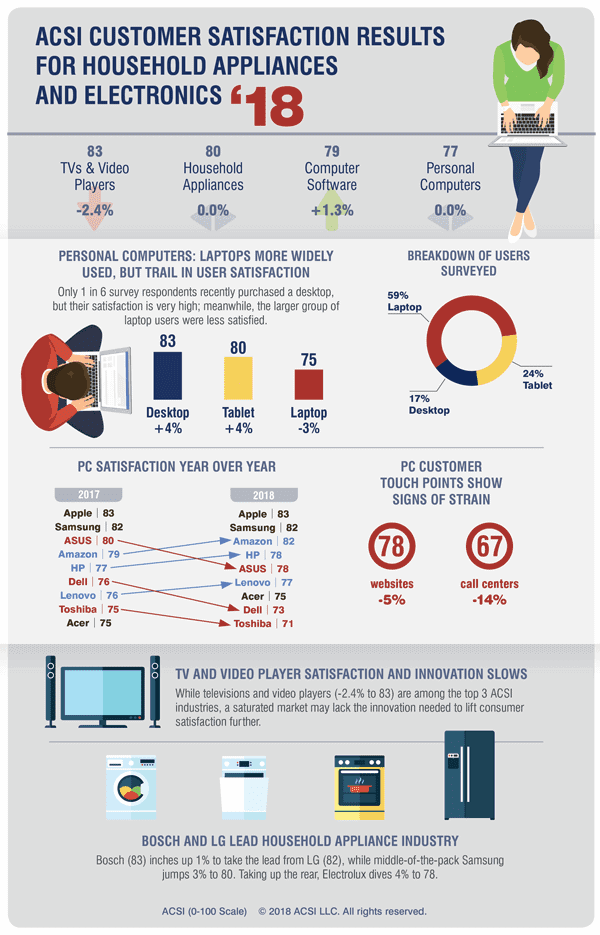ANN ARBOR, Mich. (September 25, 2018) – PCs are alive and well. Customer satisfaction with personal computers—including desktops, laptops, and tablets—remains unchanged at 77 (on a 0 to 100 scale), according to the American Customer Satisfaction Index’s (ACSI®) Household Appliances and Electronics Report 2018. This new stability is helped in no small part by the high customer satisfaction with desktop PCs.
Although just 17 percent of respondents recently purchased a desktop computer, customer satisfaction with them jumps 4 percent year over year to an ACSI score of 83. Tablets also climb 4 percent to 80, overtaking laptops, which rank as the only segment to deteriorate, down 3 percent to 75.
“Phones continue to supplant computers for web browsing, shopping, banking, and entertainment, but desktop computers are workhorses for gamers and business users,” said David VanAmburg, Managing Director at the ACSI. “These users make up a small but passionate corner of the PC market, choosing desktops for the power and functionality that phones, tablets, and even laptops still can’t match, according to our satisfaction data.”
Apple sees new challenge from Amazon in PC market satisfaction
Apple’s customer satisfaction score hasn’t changed in the last year, but it continues to lead all PC makers with an ACSI score of 83. Not surprisingly, demand for the company’s PCs remains: Apple’s second quarter PC shipments grew by 1.7 percent year over year.
Amazon leaps 4 percent year over year to 82, tying for second with Samsung, which remains unchanged. ASUS falls 3 percent to 78, tying it with HP, which is up 1 percent from the year before.
Lenovo inches up 1 percent to an ACSI score of 77, matching the industry average. Acer is right behind at 75, unchanged from a year ago.
Registering the largest drops among PC makers, Dell falls 4 percent to 73 and Toshiba plummets 5 percent to 71, its lowest mark to date. According to users, these manufacturers aren’t competing well on value. Although Dell’s desktop models are well liked, users are largely unimpressed with the company’s machine designs. Meanwhile, Toshiba users say the company’s models struggle with speed and reliability in terms of system crashes.
Most aspects of the PC industry have deteriorated in the eyes of its customers. Design slips 1 percent to 82. Accessories, software and apps, and graphics and sound all fall 1 percent to 80. Ease of operation held steady at 79, but an increase in the frequency of system crashes along with features losing some of their appeal, triggered drops in both these categories to 77. Processor speed also dips 3 percent to 76.
Important customer touch-points show considerable signs of strain. Website satisfaction retreats 5 percent to 78, and call centers, which made progress last year, completely reverse course, plummeting 14 percent to 67.
“It’s hard to pinpoint why customer satisfaction in call centers fell so much, but the PC industry’s increased emphasis on web and mobile as it scales back on call centers is a big piece,” said VanAmburg. “If you’re downsizing your operations, especially with anything related to customer service, you’re going to see a drop in satisfaction as wait times increase and it’s harder to get a person on the phone.”
Microsoft’s new approach to software updates is paying dividends
Customer satisfaction with software for desktops and laptops rose 1.3 percent to 79. Specifically, Microsoft climbs 4 percent to 79 on the strength of a successful Windows 10 upgrade cycle that favors smaller, more regular updates to improve user experience and remain innovative over rollouts of large new versions of Windows.
Microsoft’s user satisfaction now ranks even with the combined score of smaller software makers, including Adobe, Norton, Quicken and TurboTax.
Bosch tops household appliances, but Samsung takes a huge leap
Customer satisfaction with household appliances—including washers, dryers, dishwashers, refrigerators, freezers, ranges, and ovens—holds steady with an ACSI score of 80. In what has been one of the most stable industries tracked by the ACSI, there is minimal differentiation across companies. However, innovations in smart technology are beginning to take hold.
Following the rollout of its first black stainless steel kitchen suite, Bosch, up 1 percent to 83, has the highest customer satisfaction among household appliances. The announcement of a new partnership with Home Depot is expected to expand its distribution both in store and online.
Despite dropping 1 percent to 82, LG remains in second place. Samsung makes the biggest jump among household appliances, rising 3 percent to an ACSI score of 80, due in part to its leadership in smart home technology.
GE Appliances inches up 1 percent and Whirlpool slips 1 percent to meet at 79, slightly below the industry average. Electrolux takes the biggest hit, dropping 4 percent and landing at the bottom of the category with a score of 78.
Although customer satisfaction with the appliance industry remains stable, manufacturer websites have not kept pace. Website satisfaction for the industry overall plunged 7 percent to 78.
Televisions and Video Players
Customer satisfaction with televisions and Blu-ray/DVD players drops 2.4 percent to an ACSI score of 83. “TVs still rate among the top three industries tracked by the ACSI,” said VanAmburg,“but the market shows signs of saturation, lacking the innovation needed to lift consumer satisfaction further.”
The ACSI Household Appliance and Electronics Report 2018 on personal computers, computer software, major household appliances, and televisions and DVD/Blu-ray players is based on interviews with 6,062 customers surveyed between September 6, 2017, and August 29, 2018.

This press release is also available in PDF format.